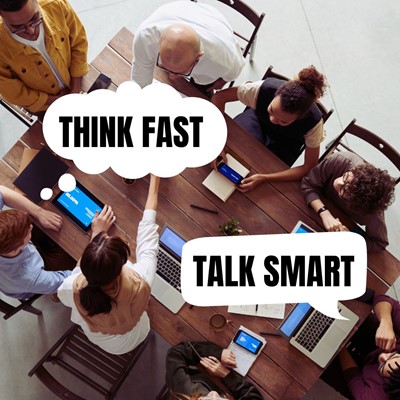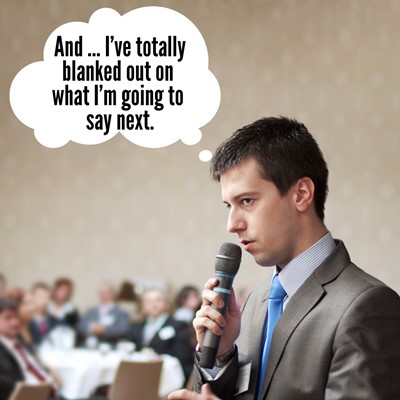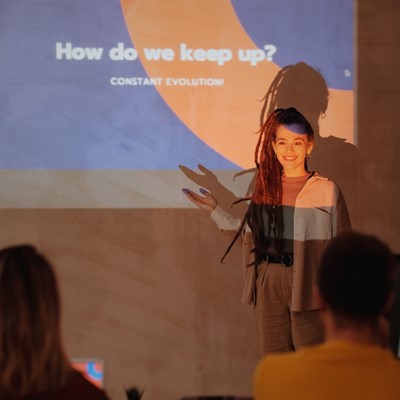
Panel discussions are a popular way to present information. We’ve learned a lot over the years as we’ve helped organizations make theirs better. In this series, we’re providing tips for planners, moderators, and panelists—to help you make sure the panel discussions you play a role in will live up to their potential.
Oh, look. There’s a panel discussion on the program. Imagine that.
After all, they’re only a staple of conferences. A go-to format for think tanks that host public forums. A featured session at many annual company meetings and retreats.
In short, they’re everywhere.
At their best, panels provide a variety of viewpoints, the chance to hear different voices, and lively discussion.
Far too often, though, we see panels that deliver something else:
- A series of loosely related presentations rather than a discussion
- Too much agreement and repetition among panelists
- One panelist who dominates the conversation (and not in an interesting way)
- A moderator who doesn’t keep things moving
- An audience member who tries to take over
- A lack of preparation by participants—because it’s "a discussion"
Whether you’re a moderator, panelist, audience member, or the organizer, you can do your part to make panel discussions more engaging.
Every month this year, we’ll share tips and techniques we’ve learned working with individuals and organizations to achieve just that.
Let’s start at the very beginning. Why is this panel discussion taking place at all?
"A panel discussion should never be a time filler, easy option or done simply because it is 'expected.'"
– From the "Ultimate Guide to Panel Discussions" at eventmanagerblog.com
Be clear about what you’re trying to achieve
This goes especially for the person who’s organizing the panel, but it’s critical for the moderator and panelists, too. If you’re spending your time—and taking up the audience’s time—you need to know where the value is for all of you.
Whether you’re the person who decided “hey we need a panel discussion” or an (un)willing participant, consider these five questions:
1. What’s my mission here?
Organizations use panel discussions for any number of reasons, including these we’ve heard:
- There are genuine differences of opinion, and we want to explore them.
- We think it will be more interesting to hear from several people instead of just one.
- It’s important to bring diversity of perspective to the topic.
- We need to showcase more of our executive team.
- We’re hoping for something almost as wild and crazy as a Jerry Springer episode.
These can all be legitimate reasons. The most important thing is that you know why you’re choosing to go with this format—and what you want the audience to take away.
We see a lot of people default to the panel discussion, because they believe it will somehow be less work or automatically be less boring. Neither of these is necessarily true.

2. How can I assemble the best panel and moderator?
It helps to first understand your mission (see above).
For example, if you’re trying to explore a full range of views, you should seek out panelists who have different slants—whether it’s a difference in age and background or a full-blown difference of opinion. This may seem obvious, yet we see a lot of panels that consist of people who are all saying the same thing in the same way.
If your goal is to showcase more of your executive team to employees or investors, the selection process might not be as open. After all, they are who they are. The opportunity here might be to tweak the topic or to choose a moderator who can bring a fresh perspective or facilitate a lively discussion that lets each panelist bring their experience or expertise to the subject.
"Eventually, someone on a panel you moderate is going to develop a serious case of motor mouth."
– Rebekah Iliff, giving advice to panel moderators in Entrepreneur magazine
3. How should I format the discussion to make the best use of resources?
It seems the number one resource should be the members of your panel. Be sure to create a plan (see next section) that makes the best use of what panelists have to offer.
All participants should also consider:
- Moderator role: Is the moderator just a facilitator or also an expert?
- Audience: What role do you have for audience interaction with the panel and how will you manage it?
- Format: Will this be a discussion only? Or will each panelist to present something? If so, how can you make sure this is more than a series of presentations?
- Staging: Will people sit on barstools or behind a table, sprawl across a couch on a low platform or stand at lecterns on a true stage? Where will the moderator be in relation to the panel and the audience? While this may seem secondary to you, it can have a considerable impact on how the panelists interact with each other and the audience.
- Technical support: Is this a simple panel discussion before a live audience? How much tech support will you need? Is there a need (or an opportunity) to engage people in new ways? Is the hassle/risk of failure worth it?
Obviously, these questions are better answered when you understand the reason behind the panel discussion.

4. What kind of prep do participants need?
We find there’s uncertainty about this with many of the groups we coach--which leads to the misconception that panels are easier to produce than presentations.
If you’re coordinating the panel, it helps to have a prep plan that includes a few clear-cut steps and a timeline for getting everyone on board with the why. If you're participating, don't be shy about asking for direction.
That direction might include:
- Phone calls with each panelist and the moderator to discuss session goals, the topic, and possible questions
- A conference call with the panelists and moderator to discuss the topic and logistics
- A meeting and rehearsal/coaching session with the moderator—particularly if you expect challenging questions from the audience
- A rehearsal/walk through for all participants—especially if there will be presentations by panelists or any technical challenges
"The best panel presenters are adept at simplifying their content—making it feel more relatable and connected to the audience’s own knowledge and experience."
– From a Stanford Business School article on how to produce audience-focused panels
5. How can we make this an audience-focused discussion?
The best panel discussions give the audience something they wouldn’t get by just hearing a series of individuals speak on a topic.
As you put your panel discussion together, keep the audience in mind:
- How can this discussion benefit the audience? Why does the audience care about this subject?
- How can panelists make their information relevant for this audience?
- How can the moderator work on behalf of the audience to steer conversations and clarify information?
- What will the audience take away?
Another benefit of an audience focus is this: It helps you avoid the “exclusive club” feeling that some panel discussions create. You’ve probably seen panel discussions that devolved into semi-private conversations or ego-fests, as if the panel has gone out for happy hour to talk shop and you’re the unlucky spouse who had to tag along.
Which brings us back to the original question: Why?
Before you agree to organize a panel discussion...before you agree to participate as a moderator or panelist...know why this discussion is on the agenda, why you have something to contribute, and why the audience cares.
Want to read more about how panels can connect with specific audiences? Here's a good article from Stanford Business School that explores the topic






